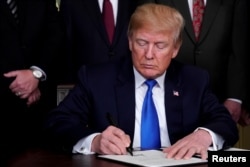The fate of Cabinet-level economic talks between the United States and China is unclear amid escalated trade disputes and recent tariff retaliation measures announced by both countries.
A U.S. official, who spoke to VOA on condition of anonymity, said Friday that there were no imminent signs on resuming the U.S.-China Comprehensive Economic Dialogue (CED) that has been "stalled" since the inaugural round ended with no tangible progress last July.
The CED is one of four high-level talks aimed at boosting bilateral ties that Washington announced after U.S. President Donald Trump met with Chinese President Xi Jinping at Trump's Mar-a-Lago estate in Florida in April 2017.
The mechanism is co-chaired by U.S. Treasury Secretary Steven Mnuchin, Commerce Secretary Wilbur Ross and China's Vice Premier Wang Yang.
VOA reached out to both departments for confirmation that the CED is in limbo but has not received a response.
The trade dispute between the countries escalated Friday, with Trump threatening tariffs on an additional $100 billion worth of Chinese goods and China warning it will fight the U.S. "at any cost."
Washington's threat of additional tariffs came after Beijing issued a list of U.S. goods worth $50 billion for possible tariff increases. The United States had proposed tariffs on $50 billion worth of Chinese goods this past week.
One analyst said he thought the U.S.-China talks could not be revived.
"For all intents and purposes, the CED is dead. Eventually, the two sides are going to need some kind of bilateral dialogue to resolve their differences, but right now everyone is focused on managing the trade escalation, and not on formal mechanisms like the CED," said Matthew Goodman, senior adviser for Asian economics at the Center for Strategic and International Studies in Washington.
David Malpass, undersecretary for international affairs at the Treasury Department, said in March that no decisions had been made about the future of the CED, amid increasing concerns about China's move away from market liberalization. Malpass made his comments while speaking to reporters in Buenos Aires during a conference.
But in an interview with the Financial Times in November, Malpass said the Cabinet-level dialogue had been "stalled" and there were no plans to revive it.
When asked about talks and how to avoid a trade war, China's ambassador to the U.S., Cui Tiankai, told State Department reporters on Wednesday, "Both parties need to have [the] political will," adding it would not work if only China had the will.
On February 8, China's State Councilor Yang Jiechi told Chinese media, following talks with then-U.S. Secretary of State Rex Tillerson, that both countries had agreed to resume the CED "as soon as possible" this year.
The State Department, however, made no mention of the reported resumption in public statements following the meeting.
"I think the Trump administration should use any possible dialogues with China to negotiate a way out of a possible trade war," said Harry Kazianis, director of defense studies at the Center for the National Interest, adding Beijing has been "very reactive and defensive while not offering any viable proposals" to alter what Washington says is an unfair trade relationship.
"The good news is that we have time to see both sides, offer proposals and engage in dialogue," Kazianis said. "As U.S. tariffs will not kick in until mid-May and China has not placed a start date on its own sanctions, we may have time to work out a grand bargain of sorts."
The Comprehensive Economic Dialogue is one of the four of U.S.-China talks initiated under the Trump administration. The others are the Diplomatic and Security Dialogue, the Law Enforcement and Cybersecurity Dialogue, and the Social and Cultural Issues Dialogue.
This report was written by VOA's Nike Ching.





